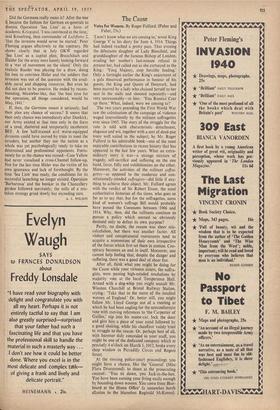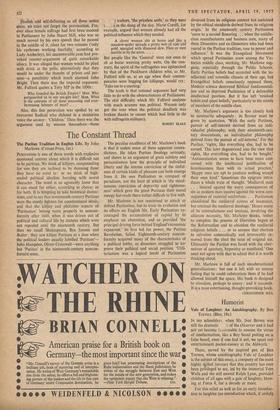The Cause
`I DON'T know what we are coming to,' wrote King George V in his diary for June 4, 1914. Things had indeed reached a pretty pass. That evening the debutante daughter of Lady Blomfield, and granddaughter of the famous Bishop of London, evading her mother's last-minute refusal to present her, had called out as she curtseyed to the King : 'You; Majesty, stop forcible feeding.' Only a fortnight earlier the King's enjoyment of a gala theatrical performance in honour of his guests, the King and Queen of Denmark, had been marred by a lady who chained herself to her seat in the stalls and shouted repeatedly—and very unreasonably—at him : 'You Russian Czar up there.' What, indeed, were we coming to'?
The two years preceding the First World War saw the culmination of the campaign of violence waged intermittently by the militant suffragettes ever since 1905. The story of the struggle for the vote is told with characteristic detachment, elegance and wit, together with a sort of dead-pan irony well suited to the subject, by Mr. Roger Fulford in his admirable book—one of the most enjoyable contributions to recent history that has appeared in the last few years. What an extra- ordinary story it was—a strange mixture of tragedy, self-sacrifice and suffering on the one hand, farce, folly and exhibitionism on the other. Moreover, the activities of the militant suffra- gettes—as opposed to the moderate and con- stitutionally-minded suffragists—did little if any- thing to achieve their object. Mr. Fulford agrees with the verdict of Sir Robert Ensor, the most authoritative historian of the times, who goes so far as to say that, but for the suffragettes, some kind of women's suffrage Bill would probably have passed the Commons between 1906 and 1914. Why, then, did the militants continue to pursue a policy which seemed so obviously destined only to defeat its own purpose?
Partly, no doubt, the reason was sheer mis- calculation, but there was another factor. All violent and conspiratorial movements tend to acquire a momentum of their own irrespective of the forces which first set them in motion. Con- spiracy becomes. an end in itself. Moreover, one cannot help feeling that, despite the danger and suffering, there was a good deal of sheer fun.
After all, think what you might be doing for the Cause while your virtuous sisters, the suffra- gists, were passing high-minded resolutions by majority vote at the local Temperance Hall. Armed with a dog-whip you might assault Mr. Winston Churchill at Bristol Railway Station. crying : 'Take that in the name of the insulted women of England.' Or, better still, you might follow Mr. Lloyd George out of a meeting at which he had been angling for the nonconformist vote with moving references to 'the Carpenter of Galilee,' nip into his motor-car, lock the door and give him a piece of your mind followed by a good shaking, while his chauffeur vainly 'tried to struggle to the rescue. Or, perhaps best of all, with hammer duly concealed in your muff, you might be one of the dedicated company which at precisely 4 o'clock on March 1, 1912, broke every shop window in Piccadilly Circus and Regent Street.
At the ensuing police:-court proceedings you might have a chance, like the 'General' (Miss Flora Drummond), to shout at the prosecuting counsel : 'You sit down, you Jack-in-the-box. You have been earning your living easily enough by hounding down women. You come from Blue- beard at the Home Office' (a somewhat harsh allusion to the blameless Reginald McKenna). Foolish and self-defeating as all these antics seem, we must not forget the provocation. For, ever since female suffrage had first been mooted in Parliament by John Stuart Mill, who was so much moved by his own speech that he paused in the middle of it, silent for two minutes ('only his eyebrows working fearfully,' according to Lady Amberley), his unanswerable case had pro- voked counter-arguments of quite remarkable idiocy. It was alleged that women would be plied with drink at the polls, alternatively that they would be under the thumbs of priests and par- sons—a possibility which much alarmed John Bright. Then there was the imperial argument.
Mr. Fulford quotes a Tory MP in the 1890s : Who founded the British Empire? Man. Who safeguarded us in our sea-girt isle? Man. What is the outcome of all these unceasing and ever- increasing labours of man? . . .
Alas, this fine peroration was spoiled by an irreverent Radical who shduted in a stentorian voice the answer : 'Children.' Then there was the argument used by women themselves—those
• , '1 traitors, 'the priceless antis,' as they were
_ a in the slang of the day. Marie Corelli, for example, argued that women already had all the political influence which they needed.
A clever woman sits at home and like a meadow-spider spreads a pretty web of rose and gold, spangled with diamond dew. Flies or men tumble in by the score. . . .
But people like the 'General' were not ones .to sit at home weaving pretty webs. On the con- trary, the spirit of the suffragettes was epitomised by that of the Pankhurst children who, as Mr.
Fulford tells us, at an age when their contem- poraries were begging for lollipops, would cry : 'Take me to a meeting.'
The truth is that rational argument had very little to do with the obstructionism of Parliament.
The real difficulty which Mr. Futford analyses with much acumen was political. Women only got the vote when the political deadlock was broken thanks to causes which had little to do with suffragette militancy.
ROBERT BLAKE



































 Previous page
Previous page